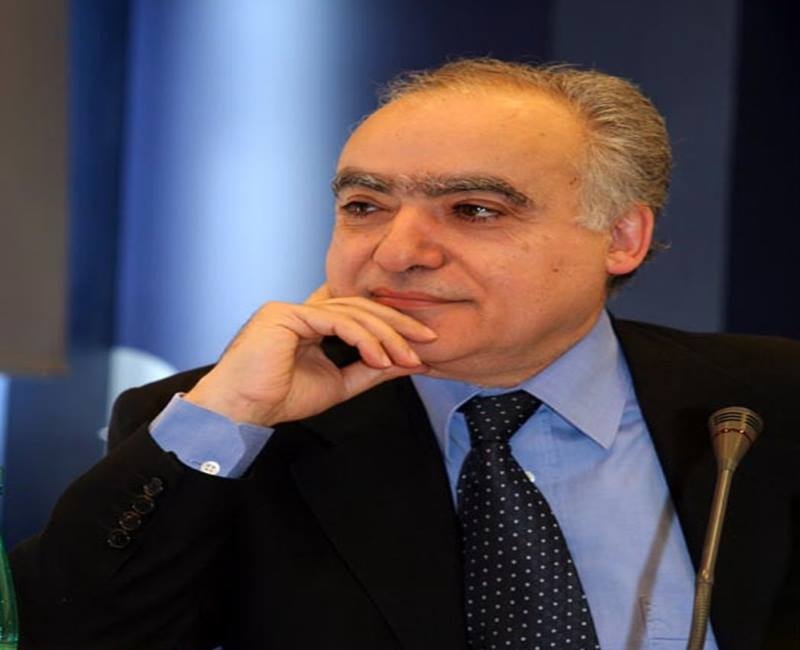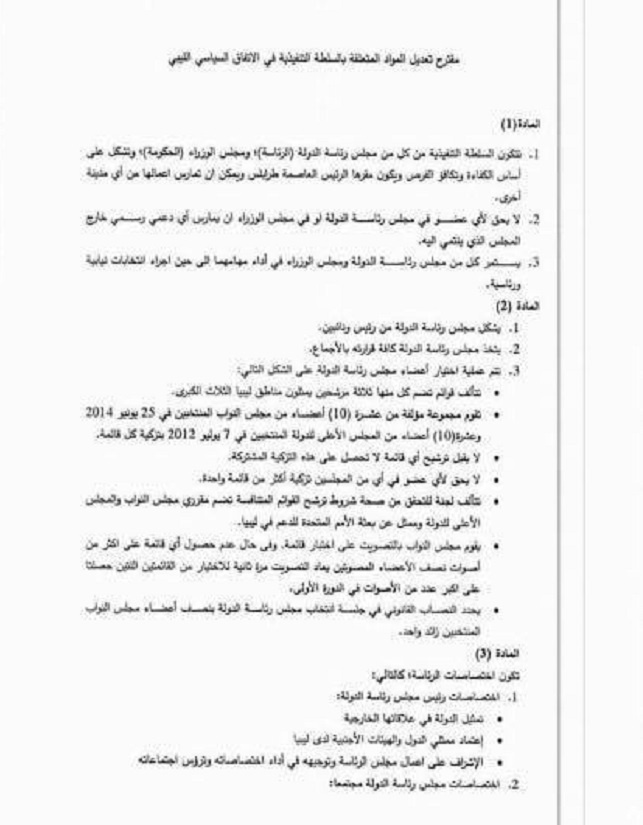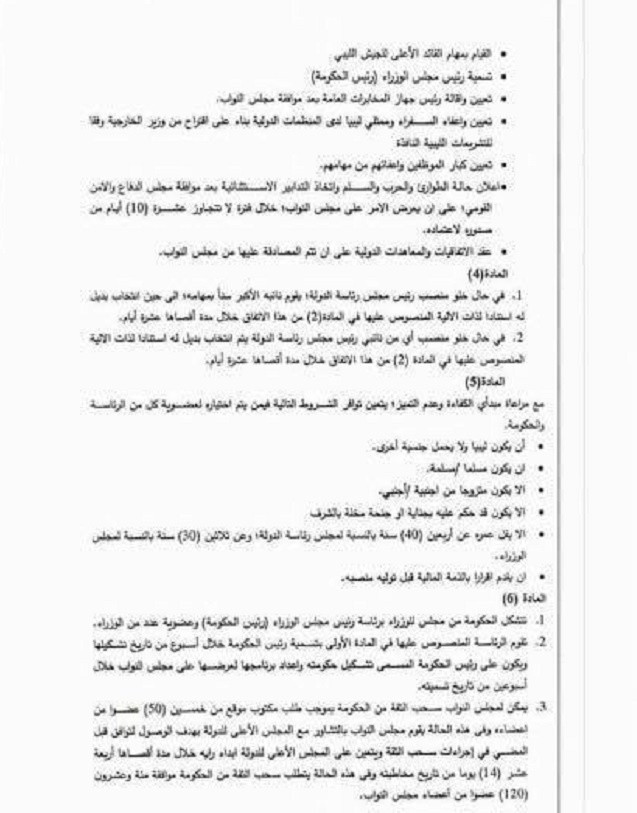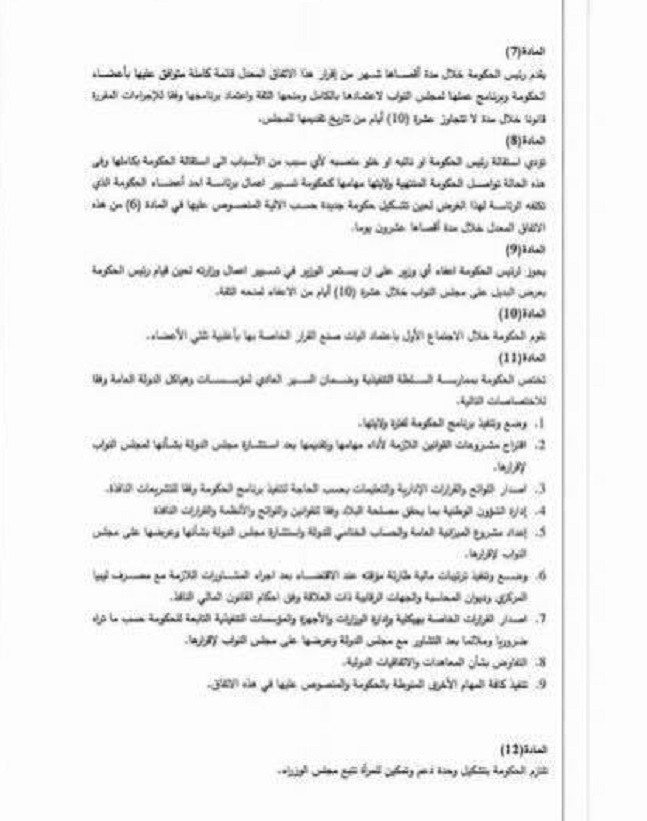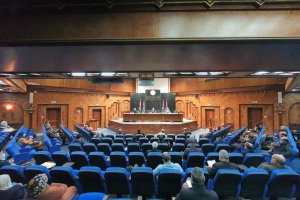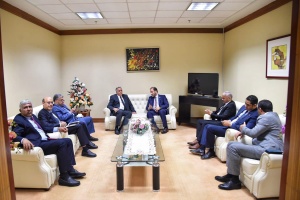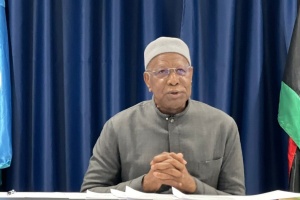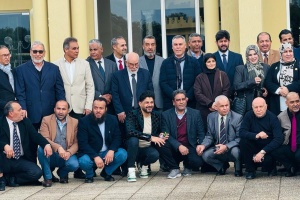UN envoy to Libya Ghassan Salame presented in mid-November an initiative to amend certain articles of the Libyan Political Agreement regarding the executive authority. The proposed amendments were approved by the House of Representatives and refused by the High Council of State. Here are Salame’s proposed amendments of the Libyan Political Agreement.
Article 1
1 - The executive authority is to be composed of both the State Presidency (the Presidency) and the Council of Ministers (the Government). It will be formed on the basis of efficiency and equal opportunities. Its headquarters is located in the capital, Tripoli, and can operate from any other city.
2 - No member of the State Presidency or of the Council of Ministers shall be entitled to exercise any official act outside the council to which he belongs.
3 - The State Presidency and the Council of Ministers shall continue to perform their functions until the holding of a new parliamentary and presidential elections.
Article 2
1 - The State Presidency shall compose of a president and two vice-presidents.
2 - The State Presidency would take its decisions by consensus.
3 - The process of selecting the members of the State Presidency shall be as follows:
- Lists shall be created consisting of three candidates representing the three major regions of Libya.
- A group of ten members of the House of Representatives elected on 25 June 2014 and ten members of the High Council of the State elected on July 7, 2012, will recommend each list.
- No nomination of any list that does not receive this joint sponsorship will be accepted.
- No member of both councils may recommend more than one list.
- A committee to verify the eligibility of candidates of the competing lists shall be composed of the rapporteurs of the House of Representatives, the High Council of the State and a representative of the United Nations Support Mission in Libya.
- The House of Representatives is to vote to select a list.
- In the event that no list receives more than half of the valid votes of the voting members, a second round of voting is held to re-elect the two lists that obtained the largest number of votes in the first session.
- A quorum for the election session of the State Presidency shall be determined by half of the elected members of the House of Representatives plus one.
Article 3
The duties of the State Presidency shall be as follows:
1- Duties of the President of State Presidency:
- Representation of the state in its external relations.
- Adopting of representatives of foreign countries and entities in Libya
- Supervising and steering the work of the Presidency Council in the performance of its functions and presiding over its meetings
2 - Duties the State Presidency as a whole:
- To serve as Commander in Chief of the Libyan Army.
- Nomination of the Prime Minister.
- Appointment and dismissal of the chief intelligence after the approval of the House of Representatives.
- Appointing and exempting Libyan ambassadors and representatives from international organizations on the proposal of the Minister of Foreign Affairs in accordance with the Libyan legislations in force.
- Appointing senior officials and relieving them of their duties.
- Declaring a state of emergency, war, and peace, and taking exceptional measures after the approval of the National Defense and Security Council, provided that the matter is to be submitted to the House of Representatives within a period not exceeding ten days from its issuance for adoption.
- The conclusion of international agreements and treaties, provided to be ratified by the House of Representatives.
Article 4
1- In the case of a vacancy of the President of State Presidency, his senior deputy shall perform his duties until a successor is elected within a maximum period of ten days in accordance with article 2 of this agreement
2- In the event of a vacancy of the post of either vice-presidents of the Presidency of the State, a successor shall be elected within a maximum period of ten days in accordance with article 2 of this agreement
Article 5
Subject to the principles of competence and non-discrimination, the following conditions must be met for those selected to the Presidency and the Government:
- He / She must not hold a second nationality other than the Libyan one.
- He/she must be a Muslim.
- Not to be married to a foreigner.
- He / She must not have been convicted of a felony or misdemeanor.
- He / She must be over 40 years for the presidency of the State, and 30 years for the council of ministers.
- He / She must submit a financial disclosure statement before taking office.
Article 6
1 - The Government is composed of the Council of Ministers. It is chaired by the Prime Minister and its members include a number of ministers
2- The Presidency provided for in article 1 shall nominate the Prime Minister within one week from the date of its formation. The Prime Minister shall form the Government and develop its program for submission to the House of Representatives within two weeks from the date of his designation.
3 - The House of Representatives may withdraw confidence from the Government by a written request signed by fifty members. In this case, the House of Representatives shall consult with the High Council of State with a view to reaching a consensus before proceeding with the withdraw of confidence from the Government. The High Council of State should give its opinion within a maximum period of fourteen days from the date of the address. In this case, the withdrawal of confidence from the Government requires the approval of 120 members of the House of Representatives.
Article 7
The Prime Minister shall, within a maximum period of one month from the date of the adoption of this amended agreement, submit an agreed upon list of members of the Government and its work program to the House of Representatives for full adoption, and to adopt its program in accordance with the legally binding procedures within a period not exceeding ten days from the date of its submission to the HoR.
Article 8
The resignation of the Prime Minister or his deputy or the vacancy of the Prime Minister's post, for any reason, leads to the resignation of the entire government. In this case, the outgoing government shall continue its function as a caretaker government headed by a member of the government which is mandated by the State Presidency for this purpose until the formation of a new government within a maximum of twenty days in accordance with article (6) of this amended agreement.
Article 9
The Prime Minister may exempt any minister, provided that the minister shall continue to conduct the work of his ministry until the Prime Minister presents a successor to be approved by the House of Representatives within ten (10) days of the exemption to grant him confidence.
Article 10
During the first meeting, the Government adopts its decision-making mechanisms by a two-thirds majority of the members.
Article 11
The exercise of executive power and ensuring the normal functioning of the public institutions and structures of the State is vested in the Government in accordance with the following terms of reference:
1 - Development and implementation of the government's program for the term of office.
2 - Propose draft laws necessary to fulfil its task and submitting them, after consultation with the High Council of State, to the House of Representatives for approval.
3 - Issuing regulations, administrative decisions, and instructions as necessary to implement the government program in accordance with the legislation in force.
4 - To manage the national affairs in the interest of the country in accordance with the laws, regulations, statutes, and decisions in force.
5 - Preparing the draft public budget and final account of the state and consulting with the High Council of State to submit them to the House of Representatives for approval.
6 - Developing and implementing, as necessary, interim emergency financial arrangements after necessary consultations with the Central Bank of Libya, the Audit Bureau and the relevant regulatory bodies in accordance with the provisions of the applicable financial laws.
7 - Issuing the decisions concerning the structure and administration of the ministries, agencies and executive institutions of the government as it deems necessary and appropriate after consulting with the High Council of State and presenting them to the House of Representatives for approval.
8 - Negotiation, ratification of international treaties and agreements.
9 - To carry out all other functions entrusted to the government and provided for in this agreement.
Article 12
The government is committed to forming a Women's Support and Empowerment Unit subordinated to the Council of Ministers.

